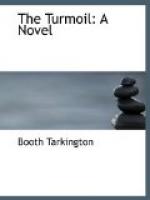“No,” he said; “I can’t imagine you with a care in the world. I think that’s why you were so kind to me—you have nothing but happiness in your own life, and so you could spare time to make my troubles turn to happiness, too. But there’s one little time in the twenty-four hours when I’m not happy. It’s now, when I have to say good night. I feel dismal every time it comes—and then, when I’ve left the house, there’s a bad little blankness, a black void, as though I were temporarily dead; and it lasts until I get it established in my mind that I’m really beginning another day that’s to end with you again. Then I cheer up. But now’s the bad time—and I must go through it, and so—good night.” And he added with a pungent vehemence of which he was little aware, “I hate it!”
“Do you?” she said, rising to go to the door with him. But he stood motionless, gazing at her wonderingly.
“Mary! Your eyes are so—” He stopped.
“Yes?” But she looked quickly away.
“I don’t know,” he said. “I thought just then—”
“What did you think?”
“I don’t know—it seemed to me that there was something I ought to understand—and didn’t.”
She laughed and met his wondering gaze again frankly. “My eyes are pleased,” she said. “I’m glad that you miss me a little after you go.”
“But to-morrow’s coming faster than other days if you’ll let it,” he said.
She inclined her head. “Yes. I’ll—’let it’!”
“Going to church,” said Bibbs. “It is going to church when I go with you!”
She went to the front door with him; she always went that far. They had formed a little code of leave-taking, by habit, neither of them ever speaking of it; but it was always the same. She always stood in the doorway until he reached the sidewalk, and there he always turned and looked back, and she waved her hand to him. Then he went on, halfway to the New House, and looked back again, and Mary was not in the doorway, but the door was open and the light shone. It was as if she meant to tell him that she would never shut him out; he could always see that friendly light of the open doorway—as if it were open for him to come back, if he would. He could see it until a wing of the New House came between, when he went up the path. The open doorway seemed to him the beautiful symbol of her friendship—of her thought of him; a symbol of herself and of her ineffable kindness.
And she kept the door open—even to-night, though the sleet and fine snow swept in upon her bare throat and arms, and her brown hair was strewn with tiny white stars. His heart leaped as he turned and saw that she was there, waving her hand to him, as if she did not know that the storm touched her. When he had gone on, Mary did as she always did—she went into an unlit room across the hall from that in which they had spent the evening, and, looking from




